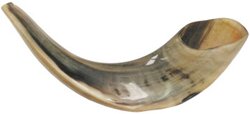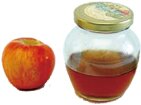| Rosh Hashanah - the basics |

|

|
|
A key component of Rosh Hashanah preparation is to ask for forgiveness from anyone one may have wronged during the previous year. To whatever extent possible, we want to begin the year with a clean slate -- and without anyone harbouring a grudge against us. One should also be quick to forgive those who have wronged him.
Many people have the custom to go to the mikveh before Rosh Hashanah after midday. A mikveh, which has the power to purify from certain types of spiritual impurities, can be an important part of the teshuva process. Some have the custom of visiting a cemetery on the morning of Rosh Hashanah and praying at the graves of the righteous. Of course, we do not pray “to” the righteous, but only to God who hears our prayers in the merit of the righteous. The morning before Rosh Hashanah, we perform “Hatarat Nedarim” -- annulling all vows. This is done by standing in front of three adult males (or 10 if available), and asking to be released from the vows that were made. The full text can be found in a Siddur or Rosh Hashanah Machzor.
The Festive Meal During the High Holidays, a round challah is used -- symbolising fullness and completion. After making the “Hamotzi” blessing, it is customary to dip the bread into honey -- symbolising our prayer for a sweet new year.
Why do we ask for both a “good” and “sweet” year? Doesn’t the word “good” automatically include “sweet?” Judaism teaches that everything happens for the good. It is all part of the divine will. Even things that may look “bad” in our eyes, are actually “good.” So when we ask God that the year should be “sweet” (in addition to good), it is because we know that everything will be for the good. But we also ask that it be a “revealed” good -- i.e. one that tastes “sweet” to us. On Rosh Hashanah, we add the paragraph Ya’aleh V’yavo in Grace After Meals.
Symbolic Foods On Rosh Hashanah, we eat foods that symbolise good things we hope for in the coming year. We contemplate what these foods symbolise, and connect with the source of all good things. The symbolic foods are based on a word game which connects the name of a certain food, to a particular hope we have for the new year. Here is a list from the Talmud of symbolic foods customarily eaten on Rosh Hashanah: leek or cabbage, beets, dates, gourd, pomegranate, and a fish head.
Rosh Hashanah Prayers Since there are so many unique prayers on Rosh Hashanah, we use a special prayer book called a “Machzor.” During the High Holidays, the curtain on the ark is changed into a white one, to symbolise that our “mistakes will be whitened like snow.”
The Shofar The essential mitzvah of Rosh Hashanah is to hear the sounding of the shofar. The shofar blasts after the Torah Reading are called “Tekiot M’yushav.” It is customary to blow shofar in the same place that the Torah is read, so that the merit of the Torah will support us. The shofar should be blown during the daytime. The shofar is not blown when Rosh Hashanah falls on Shabbat.
Other Customs It is customary to greet others as follows: “L’shana Tova -- Ketivah vi-chatima Tova.” This means: “For a good year -- You should be written and sealed in the good (Book of Life).” One should try not to sleep or go for idle walks on the day of Rosh Hashanah. (The Arizal permits a nap in the afternoon.) If a Brit Milah falls on Rosh Hashanah, it should be performed between the Torah reading and the shofar blowing.
Tashlich The “Tashlich” prayer is said on the first afternoon of Rosh Hashanah by a pool of water that preferably has fish in it. These prayers are symbolic of the casting away of our mistakes. If Rosh Hashanah falls out on Shabbat, “Tashlich” is pushed off until the second day. If “Tashlich” was not said on Rosh Hashanah itself, it may be said anytime during the Ten Days of Repentance. Both the body of water and the fish are symbolic. In Talmudic literature Torah is represented as water. Just as fish can’t live without water, so too a Jew can’t live without Torah! Also, the fact that fish’s eyes never close serve to remind us that, so too, God’s eyes (so to speak) never close; He knows of our every move.
Extracts supplied by Aish.com
|



















